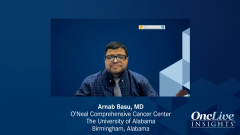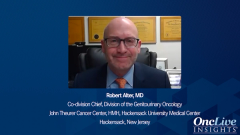
Approved First-Line IO-IO Combination Treatment Regimens for Advanced RCC
A review of the first-line IO/IO combination regimens available for advanced RCC.
Episodes in this series

Arnab Basu, MD: That’s a great case, Dr Anakwah. It shows us the double-edged sword that immunotherapy [IO] is, in terms of the efficacy, in terms of the durable efficacy and sometimes the adverse effect profile. But for our audience, Dr Anakwah, if you would please briefly review the first-line IO/IO combination regimen approved for patients with RCC [renal cell carcinoma].
Shawnta Anakwah, MD: These data come from the CHECKMATE 214 study, published in 2018, which was a phase 3 randomized trial, where they randomized patients in a 1:1 fashion to receive nivolumab with 4 doses of ipilimumab every 3 weeks, followed by nivolumab maintenance every 2 weeks, compared to sunitinib at standard dosing. What the study showed was that in the dual immunotherapy group, overall survival [OS] and objective response rate were significantly higher in the immunotherapy group, in patients who were intermediate or poor risk. The median overall survival in the sunitinib group was 26 months and was not reached at the time of publication. But recent estimates are that there’s probably going to be about a 60-month survival in the immunotherapy group as a 5-year update, so impressive.
Arnab Basu, MD: That’s right. The durability of the response is a major draw for this doublet immunotherapy regimen, and I’m glad that the patient had such a good outcome in terms of survival. Could you describe your decision-making process in choosing ipi-nivo [ipilimumab and nivolumab] for this patient? And for which patients do you use IO/IO versus IO/TKI [tyrosine kinase inhibitor] in your practice?
Shawnta Anakwah, MD: I’ll take patients who, first of all, who don’t have any severe autoimmune diseases, so there wouldn’t be a contraindication. And especially younger patients with not as high of a disease burden, because these regimens have been shown to have a higher chance of a more durable CR [complete response] compared to some of the other regimens. Especially patients with the more sarcomatoid histology, like this patient, is why I picked this regimen for this patient.
Arnab Basu, MD: It also tends to be a well-tolerated regimen, once patients go through the doublet therapy phase. Indeed, there are some quality-of-life outcomes data presented by…at ESMO [European Society for Medical Oncology meeting] 2020. The time to first deterioration and time to confirmed deterioration with the doublet immunotherapy was longer. The median time to first deterioration in ipilimumab, nivolumab patients was almost double that of sunitinib. And then, time to confirmed deterioration was around 7.2 months compared to just 2.9, and a very well valuated FKSI-19 [Functional Assessment of Cancer Therapy-Kidney Symptom Index] total score, which is relevant to clinical practice as this is confirmatory of a phenomenon we observe. Indeed, these patients have some of the highest percentages of time off therapy with continuing responses. These patients almost had 3 times the treatment-free survival as patients did on sunitinib.
Transcript edited for clarity.








































